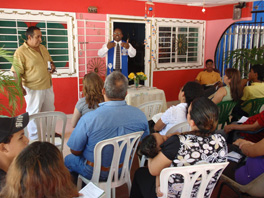The worshippers sat in plastic chairs, not pews. The music they heard came not from a piano or organ, but a CD player. And surrounding the worship area were not stained glass windows, but the sounds of neighbors coming and going.
The setting may have seemed unusual to many Presbyterians used to attending church in the United States, but the message and sense of family presented in this carport church was the same, if not stronger.
Ciudadela Metropolitana is a new church development in Soledad, south of Barranquilla. The congregation meets in a carport, right in the middle of a neighborhood where many of its members live.
The new congregation is an outreach of Ninth Presbyterian Church, part of the Presbyterian Church of Colombia (Iglesia Presbiteriana de Colombia, or IPC). Ciudadela Metropolitana began when 28 members of Ninth who live in Soledad started a prayer group in their area. Before the church started here, residents of Soledad had to take a long bus ride to get to Ninth.
The two churches continue to support each other and maintain close contact — members of Soledad attend Ninth on the first Sunday of the month, and members of Ninth travel to Soledad on the third Sunday.
Apollinar Escobar is the pastor here at Soledad, but he’s also a full-time student at the Universidad Reformada, a Presbyterian college and theological school in Barranquilla. The university’s campus is also home to the offices of the Presbytery of the Coast of the IPC.
Escobar is in his second of five years of study and leads the church every Sunday. On Jan. 17, however, he turned his “pulpit” over to the Rev. Byron Wade, vice moderator of the 218th General Assembly of the Presbyterian Church (U.S.A.).
Wade was in Soledad as part of a nine-day visitation to Central and South America.
“I bring you greetings in the name of our savior Jesus Christ and I want you to know we are praying for you,” said Wade, whose sermon was translated from English to Spanish for the congregation.
Wade preached from Joshua 1:1-9, in which God instructs Joshua to lead the Israelites after Moses’ death. In that passage, God tells Joshua to not be afraid because God is always with him.
The same is true for people now, Wade said.
“God is good to us always and always God is good,” he said. “Always God is with us wherever we go and whatever happens to us.”
When he was a little boy, Wade said his parents taught him what he needed to know — to be nice to other people, to stay in school. But when he was 18, he went out in the world on his own and sometimes wasn’t sure what to do.
“What happens when we find ourselves in a different situation and we don’t know what to do?” he asked.
Wade spoke of Moses and his call to lead the Israelites out of slavery. Moses led the people, and God promised to provide food and water. When the people complained, Moses told them to turn to God, who always was there for them.
But when Moses died, Joshua took over leading the people. Although he remembered what he learned from Moses, he was still alone. The Israelites complained, didn’t trust him and wanted to go back to Egypt.
But God always fulfills God’s promises, no matter what people say, Wade said.
“God calls you today,” he said. “You have learned everything you need from your parents, your pastors, your leaders, to take the word of God into the world today.”
Even when met with challenges, such as people who don’t want to hear the word of God, we cannot be discouraged. And the responsibility to listen to God’s call applies to everyone, not just pastors or elders, he said.
“We cannot be fearful because God has called us like God called the Israelites to a new land,” Wade said. “God did not tell us it would be easy. Don’t let anybody discourage you from being a Christian.”
Doing this work can be hard, he said. It’s easy to be scared. It’s easy to think about church only on Sunday mornings. It’s easy to read news about violence and feel helpless. This might be especially true in Colombia, which has seen decades of violence between guerilla and paramilitary fighters and has a population of millions of internally displaced people.
“Who God calls, God equips,” Wade said. “God uses you to bring God’s kingdom into the world.
“God can use you to do something great in this place,” he said. “Put your hand in God’s hand.”

